italian horse artilleery by cbg
The history of the second French expedition to Rome will never be satisfactorily told, because, while the outward circumstances point one way, the inward probabilities point another. Napoleon had said that if the Convention were not observed he would intervene, and he did intervene; nothing could seem simpler.
Yet it is not doubtful that, in his inmost heart, he was wishing day and night that something would turn up to extricate him from the Roman dilemma once for all.
While he hesitated, the Clerical party in France did not hesitate. Not a moment was thrown away by them. Towards the middle of October, it was reported that 'half royalist and half Catholic France will be in Rome in the course of the week.
Men with names belonging to the proudest French nobility—the De Lusignans, De Clissons, De Lumleys, De Bourbon-Chalens, etc., are chartering vessels, arriving in Rome by scores and hundreds, and hence hurrying to the front to take their places as privates in the Zouaves.' That, however, does not describe the most important sphere of their activity which was the ante-chamber, nay, the boudoir of St Cloud. In that palace, three years later to be rased to the ground by the Germans, the net was woven which every day closed tighter and tighter round Napoleon, till he was enveloped in its meshes past escape.
Ever since De Morny's death, the influence nearest the throne had been increasing in strength; it is needless to say in which direction it was exercised. Napoleon was ill; Maximilian's ghost floated over him; he felt his power slipping from his hands in spite of the noise and show of the Exhibition, which was supposed to mark its zenith.
The words of the old pact with the Royalists buzzed in his ears: 'Do you keep the Pope on his throne, and we will keep you on yours.' And he yielded.
Maximilian’s reign was marked by constant conflict, haplessness, and the increasing insanity of his Belgian wife, Charlotte. When Napoleon III, determined that the French adventure in Mexico had become an unsuccessful boondoggle and withdrew his troops, Maximilian refused to follow suit, citing loyalty to his conservative supporters and to their notion of an Imperial Mexico. Interestingly, Maximiliano I, as he was known, was a fairly liberal emperor who might have done the Mexican lower classes some good, had they not detested the fact that he was a foreign interloper. Juárez’s Republicans rooted out the empire in 1867, Maximilian was executed by firing squad, and Juárez would go on to become Mexican history’s greatest hero.

The 'principle' of French intervention was adopted by the council of ministers on the 17th of October. Then, and not till then, Rattazzi decided to send the Italian troops over the frontier. On finding that neither the King nor several of his colleagues in the ministry would support him, he resigned office on the 19th of the month.
pontifical zouave
It was on the day after that Garibaldi appeared in Florence. As there was no ministry, no one thought it his business to interfere with him. Cialdini, whom the King had requested to form a cabinet, did go and ask him to keep quiet till there was some properly qualified person to arrest him; but this, not unnaturally, he declined to do. He left Florence by special train for Terni, whence he crossed the frontier and joined the insurgent bands near Rome.
From the 19th to the 26th, Napoleon, again and again, ordered and countermanded the departure of the transports from Toulon. On the last date the final order was given and the ships started. The news must have just reached Paris that the King had called upon General Menabrea to undertake the task which had been abandoned by Cialdini, whose name recalled Castelfidardo too strongly to have a sound welcome either in the Vatican or at St Cloud. When Napoleon heard that Menabrea was to be Rattazzi's successor, he knew that there was no fear that the new Government, carried away by the popular current which was manifestly having its effect on the King, should, after all, order the Italian army to the front. Menabrea, the Savoyard who in 1860 chose the Italian nationality which his son has lately cast away, was the old opponent of Cavour in the Turinese chamber, and of all Italian politicians he was the most lukewarm on the Roman question. All chance of a collision between the French and Italian armies was removed. Menabrea did occupy some positions over the Papal frontier, it would be hard to say with what intention, unless it were to appear to fulfil a sort of promise given by the King during the ministerial interregnum. The troops were ordered on no account to attack the French, and as soon as the Garibaldian campaign was at an end, they were brought home. It was not worth while to send them with their hands tied to almost within earshot of where other Italians were fighting and falling. Menabrea's attitude towards the volunteers was immediately revealed by the issue of a royal proclamation, in which they were declared rebels. The French were free to act
All this time the revolution in Rome, which it was admitted on all sides would have gone far towards cutting the knot, did not begin. Besides the cause already assigned, the absence of the heads, there was another, the almost total lack of arms. To remedy this, Enrico and Giovanni Cairoli, with some seventy followers, tried to take a supply of arms up the Tiber to Rome. Only the immense importance of the object could have justified so desperate an attempt.
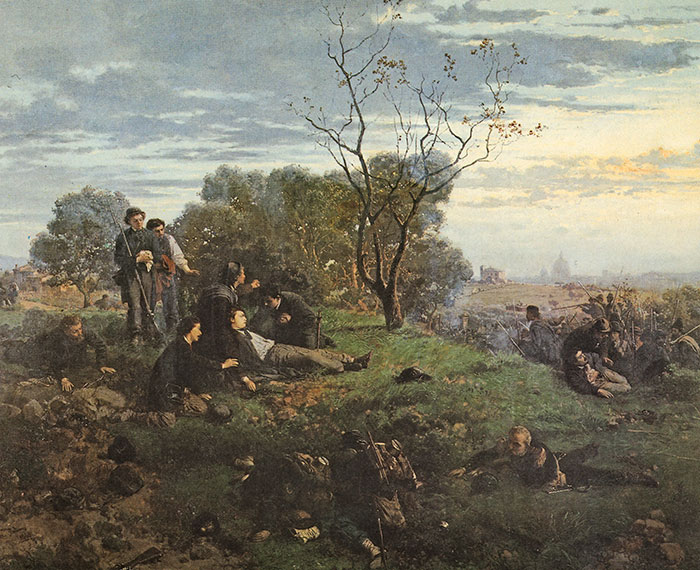 The death of cairoli
The death of cairoli
Obliged to abandon their boats near Ponte Molle, they struck off into the Monti Parioli, where they were attacked, within sight of the promised land, at a spot called Villa Gloria. Their assailants were three times their number, and those who were not killed were carried prisoners to Rome.
Among the killed was the captain of the band, who fell in the arms of his young brother. As Enrico Cairoli lay dying, the French Zouaves (was this the chivalry of France?) charged the two brothers with their bayonets, piercing Giovanni with ten wounds, from injuries arising from one of which he expired a year later, after long torments.

kill infantry
' French Scum!' cried Enrico with his last breath. They were the third and fourth sons of Adelaide Cairoli who died for their country. One only of her five children remained to stand by her own death-bed—Benedetto, the future Prime Minister, and saviour of King Humbert from the knife of an assassin.

garibaldian sentrysforza
The Papal army was composed of 13,000 men, General de Courten commanding the portion of it which could be spared out of Rome. The Breton, Colonel Charette

, had charge of the Zouaves. Since the French garrison left, much trouble had been taken to make this force efficient. Under Garibaldi's own orders there were between 7000 and 8000 volunteers. Those who have made a higher estimate have included other bands which, either from the difficulty of provisioning a larger number, or from want of time for concentration, remained at a distance.
Charette above
 irregular have now entered the arena of this war with some nice 20mm garibaldini but their opponents are bourbons only
irregular have now entered the arena of this war with some nice 20mm garibaldini but their opponents are bourbons only
The chief's arrival soon infused new life into the camp. On the 24th he moved towards Monte Rotondo(below photographed in 1867), one of the castellated heights near Rome, which commands the Nomentane and Tiburtine ways to the south, and the railway and Via Salara to the west. It was generally considered the most important military position in the Papal states. The garrison was small, but, perched as they were on a hill crest which looks inaccessible, the defenders might well hope to hold out till help came from Rome.Monte rotondo photographed at the time of the battle
They had artillery, of which the volunteers had none, and the old castle of the Orsini, where they made their principal stand, was well adapted for defence. From the morning of the 25th till midnight, the Garibaldians hurled themselves against the walls of the rock town without making much way; but at last the resistance grew weak, and when the morning light came, the white flag was seen flying. At four in the afternoon of the 26th a Papal column tardily arrived upon the scene, but they perceived that all was over at Monte Rotondo, and, after firing a few musket shots, they fled to Rome in disorder.

Monte Rotondo now
Garibaldi rode into the cathedral, where he fixed his quarters for the night. In Italy churches have ever been applied to such uses. After the reduction of Milan, Francesco Sforza rode into the Duomo, and when King Ladislaus of Naples conquered Rome, he rode into the basilica of St John Lateran. The guerilla chief bivouacked in a confessional, while his Red-shirts slept where they could on the cathedral floor. Four hundred of them had been killed or wounded in the assault.
papal troops against Garibaldini
The prisoners of war were brought before Garibaldi, who praised their valour and sent them under an escort to the Italian frontier. Two or three were retained for the following reason. Garibaldi had heard of the Cairolis' heroic failure, and after his victory his first thought was of them and of their sorrowing mother. He asked Signora Mario if there were any notabilities among the Papal prisoners. She mentioned Captain Quatrebras and others, and he sent her into Rome on a mission to the Papal commander with a view to exchanging these prisoners for the wounded Giovanni and for his brother's body. The proposal was accepted, and the compact kept after Mentana had changed the aspect of affairs.

'Garibaldi at the gates!' was the news that spread like wildfire through Rome on the evening of the 26th of October. Terror, real terror, and no less real joy filled all hearts; but the sides were soon to be reversed. Another piece of news was not long in coming: 'The French at Civita Vecchia!'

french troops by mignot
The French arrived on the 29th, and on the same day Garibaldi advanced almost to the walls of Rome, still hoping for a revolutionary movement to break out within the city; but the information which he then received deprived him finally of this hope, and he gave the order to return to Monte Rotondo. Volunteers have the defect of being soldiers who think; on this occasion they thought that the backward march was the beginning of the end—that, in short, the game was up. A third of the whole number deserted, and took the road towards the Italian frontier. Garibaldi himself seems to have had a first idea of crossing into the Abruzzi, and there waiting to see what turn events would take; but he did not long entertain it, and, when he again left Monte Rotondo, it was with the fixed design of fighting a battle. He expected, however, to fight the Papal troops alone, and not the French.There was a time in which The Pope commanded a first-class army; an army full of might and power. By the late 1860's however, The Papal States were reduced to a shadow of its former self. Decades of French and Austrian meddling in its affairs, had left it a corpse ripe of the picking.

The Pope blesses his troops
In comes 1870, The Papal States that had been propped up by Napoleon III were soon left without a sponsor. Napoleon III got his arse handed to him in a silver platter after he was captured in The Battle of Sedan. Bismark then danced over Versailles, and Paris was soon to erupt into a proto-Communist revolt.bismark
In this vacuum, The Papal States almost fell into an anarchist revolt. This forced the Italian Armies of to take over Rome, and send the Pope into a 50 year "exile" inside the walls of the Vatican.
But before all of this happened, there was one last "Pass-in-Review" held for the Papal Army. above is the only photograph that I know-of, of the Papal Army assembled together
vatican guards in happier times albeit flat and made of tin
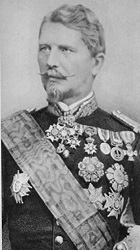
kanzler
This was very nearly being the case. On the 1st of November, the Papal General Kanzler called on General De Failly at Civita Vecchia, and found him, to his concern, by no means anxious to rush into the fray. Even when sending the troops, Napoleon seems to have hoped to escape from being seriously compromised. He probably thought that the moral effect of their landing would cause Garibaldi to retire, and that thus the whole affair would collapse.

But the Papal authorities did not want it to collapse; they wanted more bloodshed, and if the words which express the ungarnished truth as acknowledged by their own writers and apologists, sound indecent when describing the government of the Vicar of Christ, it only shows once more the irreconcilability of the offices of priest and king in the nineteenth century.
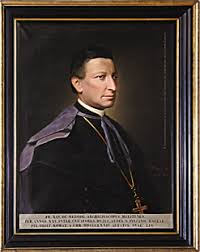
Childish dreamer Monsignor Saverio de Merode (above)was Vatican Minister of War. De Merode, a fanatical and wealthy Belgian papist, had been a soldier before entering the priesthood. Here was his opportunity to excel. He set about raising the Papal army ‘with more haste than intelligence’ fully expecting to reverse the gains of the patriots.
He worked with the Jesuits on a press campaign aimed at mobilising Roman Catholic sentiment throughout Europe. His propaganda reached as far as the French in Quebec, where 507 Canadians became the first body of troops from that land to fight abroad.
The centenary of this event was marked with a filmed re-creation of the episode entitled, With Drums and Trumpets, which although ‘sympathetic’ could not be other than ‘humorous’. Their grey uniforms and red peaked grey hats which were the dress of the Papal Zouave (light infantry) can be seen along with their rifles, bayonets and medals in the Canadian War Museum. In 1860 the French-Canadian writer Arthur Buies volunteered to serve in Garibaldi's army.
This was an extraordinary act, since many of Buies's compatriots enlisted in the opposing camp. In the early 1860s some devout Catholic French Canadians went to Italy to enlist in the pontifical army. The Pontifical States, with Rome as their capital, held the centre of the country and fought against the unification of Italy by the supporters of Piedmont and Garibaldi. The most fervent Catholics - the ultramontane - considered that the loss of Pope Pius IX's temporal power over his states would constitute a sacrilege.
The pontifical army included a corps specially formed in 1860 for volunteers from various Catholic countries, particularly France and Belgium: the Pontifical Zouave Regiment. In November 1867 the Bishop of Montreal, Monseigneur Ignace Bourget, launched an appeal for volunteers to go and defend the Pope. The idea was taken up by other prelates and was received enthusiastically across Quebec. In only a few weeks 135 recruits were selected from among 429 volunteers. These men left Montreal on February 19, 1868, to the cheers of some 20,000 people, a fifth of the city's total and a third of its French-speaking population. Other contingents followed, and of the 500 men selected 388 were to serve in the Pontifical Zouave Regiment. But for the strict eligibility criteria and the costs involved - it was necessary, by means of gifts and collections, to cover the cost of transportation of these Zouaves and their pay while in Rome - thousands of French Canadians would no doubt have been recruited.
As it was, the operation cost at least $112,000, a considerable amount for the period. The Canadians in Rome had a peaceful time of it, their war efforts limited to chasing after guerillas in the surrounding hills. Only eight of them died, most owing to illness. In the spring of 1870 most of the Zouaves in the first contingent returned to Montreal, where they were welcomed by almost 12,000 people. After symbolic resistance, Rome surrendered on September 20, 1870, and the other Canadian Zouaves were repatriated. When they arrived in Montreal a crowd of approximately 50,000 was there to receive them.
 you could cut the heads off these and replace with a kepi
you could cut the heads off these and replace with a kepi
Pius IX is reported to have been worried by the enthusiastic response from Ireland, because he feared that the temptation of readily available cheap Italian wine might impair their fighting capacity. His fears proved well founded. However the Irish priests procured many volunteers with ‘golden promises’.De Merode chose one of his French relatives, General Christofano de Lamoriciere, to command the Papal Army.
He was awarded a huge salary and commenced duty on Easter Day 1860. In his first address to the troops Lamoriciere said that the Risorgimonto (the Italian patriotic rising), menaced Europe and that, ‘The cause of the Pope is that of civilisation and the liberty of the world.’
No doubt the Vatican would repeat the same sentiments today should Rome again have access to a European Army.Lamoriciere found De Merode to be fanatical and incompetent. The Ministry of War had no map office and there were insufficient guns, ambulances and horses. The indigenous Zouaves strongly resented the foreign recruits, who were technically ignorant. Many of the officers were of ‘bad repute’.The volunteers consisted of ‘Austrians liberated from prison; turbulent and undisciplined Swiss; Spanish beggars; and starving Irish’.
When the Irish volunteers found that they had been deceived in their expectations by the priests they became riotous and set fire to their barracks declaring that ‘they would murder any foreign officers who attempted to command them.’ The disillusioned Irish volunteers became, ‘incredibly dirty and immoral’ the most loutish of their number ‘claiming their pay with menaces’. The authorities of Macerata declared that they ‘preferred even a Spanish garrison to an Irish one’.
The only volunteers recruited within the Papal States formed a regiment of ruffians nicknamed the barbacani because they ‘preferred robbery and pillage to military glory’.
The indescribable brutality of the Papal Army, particularly of the volunteers, is well chronicled, especially during the action in Perugia. Some American citizens, the Perkins, happened to be staying in a Perugian hotel. Though in possession of appropriate Pontifical papers they were attacked and robbed by the papal troops. The Vatican was faced with an embarrassing diplomatic crisis. Antonelli, the Secretary of State, replied in as many words that it was the Perkins own fault for being there.
The Americans were furious. The might of the American legation secured the prompt return of such articles as could be recovered and the refunding of the value of the other objects taken, ‘with the assurance of the Government of his Holiness to seek out the offenders and punish any violation of military law.’
 .(pictured above officers of the Company of St. Patrick formed by the vatican
.(pictured above officers of the Company of St. Patrick formed by the vatican
The vatican showed their intolerance even as regards uniforms as the French zouave uniform that they based their own upon banned the chechia as they saw it as a contradiction to have Christ’s soldiers dressed as muslims. So they wore a French-style kepi instead. The rest of the equipment is exactly the same as that of the chasseurs à pied, including the model 1853 T chasseur carabine and its yataghan, although the straps connecting the pack to the waist belt should actually not be there. The front of the kepi’s band is also missing a small brass horn. is this the rifle or am I wrong
is this the rifle or am I wrong

french chasseur. is he holding the same rifle?
Many innocent families were lass fortunate. In this action, which saw the Marches added to the evolving Italy, the incident was exploited by the patriots. Petitions were secretly disseminated prior to the invasion, to encourage the occupants to rise at the appropriate time. These made great play of the immorality and ruthlessness of the Papal troops. The Papacy may well wish to distance itself from such things but unfortunately for Rome the private views of Pius IX have been providentially preserved for us
."the petulance of the Italian people rendered self government impossible, and that the present movement in Italy could never succeed; Englishmen would not understand that Italy must be ruled by strong armies and a firm hand" was his view and if you have ever been to Italy then you may see he could be very right such is the incompetance that one encounters daily.I)t is said to be a state problem but in my opinion its a
people problem". Berlusconi has recently been accused of letting Pompei fall apart but when I was there and it was a Leftist country ruling it was honestly worse.From Pompei to a bus driver refusing to tell you where the bus is going , well this is Italy's real problem. Every one is a human being but one cannot deny the fact that people and "races"are born of social history and we see the results now.Look at the degradation of Lodon as an example after the City became a free for all
 papal zouaves
papal zouaves
Kanzler insisted that a crushing blow must be inflicted on the volunteers before they had time to retreat. He argued so long and so well that De Failly promised him a brigade under General Polhès to aid in the attack which he proposed to make on Monte Rotondo.

french paper zouaves
The Papal forces left Rome by Porta Pia, and took the Via Nomentana, which leads to Monte Rotondo by Mentana. They were on the march at four o'clock a.m. Garibaldi had ordered his men to be ready at dawn on the same day (it was the 3rd of November); but Menotti suggested that, before they started, there should be a distribution of shoes, a consignment of which had just reached the camp. Many of the volunteers were barefoot, which gives a notion of their general equipment.
 the volunteer returns home only to find his beloved dead on her death bed.
the volunteer returns home only to find his beloved dead on her death bed.
Garibaldi, who rarely took advice, yielded to his son. Had he not done so, before the Papal army reached Mentana, he would have been at Tivoli. One delay brings another, and it was midday when the march began. Garibaldi looked sad, and spoke to no one, but hummed some bars of Riego's hymn, the Spanish song of freedom, full of a wild, sweet pathos, to which his tanned-faced legionaries had marched under the Monte Videan sun. Could he but have had with him those strong warriors now! He mounted his horse, put it to a gallop, which he rarely did, and, riding down the ranks of the column, took his place at its head. When he arrived at the village of Mentana, he heard that the Pontificals were close by, and he waited to give them battle
 domenico induno. here he shows the ordinary life of italians as the war went on.A young girl gives her Dad the pennies she has made from dancing on the street,of course real history is our own personal history and Induno was consciuos of that
domenico induno. here he shows the ordinary life of italians as the war went on.A young girl gives her Dad the pennies she has made from dancing on the street,of course real history is our own personal history and Induno was consciuos of that

 d.model 54mm French officer 1870
d.model 54mm French officer 1870 Sedan The Debaclè
Sedan The Debaclè sardinian guard officer 54mm
sardinian guard officer 54mm
 d.models french dragoon 1868
d.models french dragoon 1868
 d.models 1868 trumpeter of the imperial guard
d.models 1868 trumpeter of the imperial guard brigadier. lancers of the imperial guard 1870 by d.models
brigadier. lancers of the imperial guard 1870 by d.models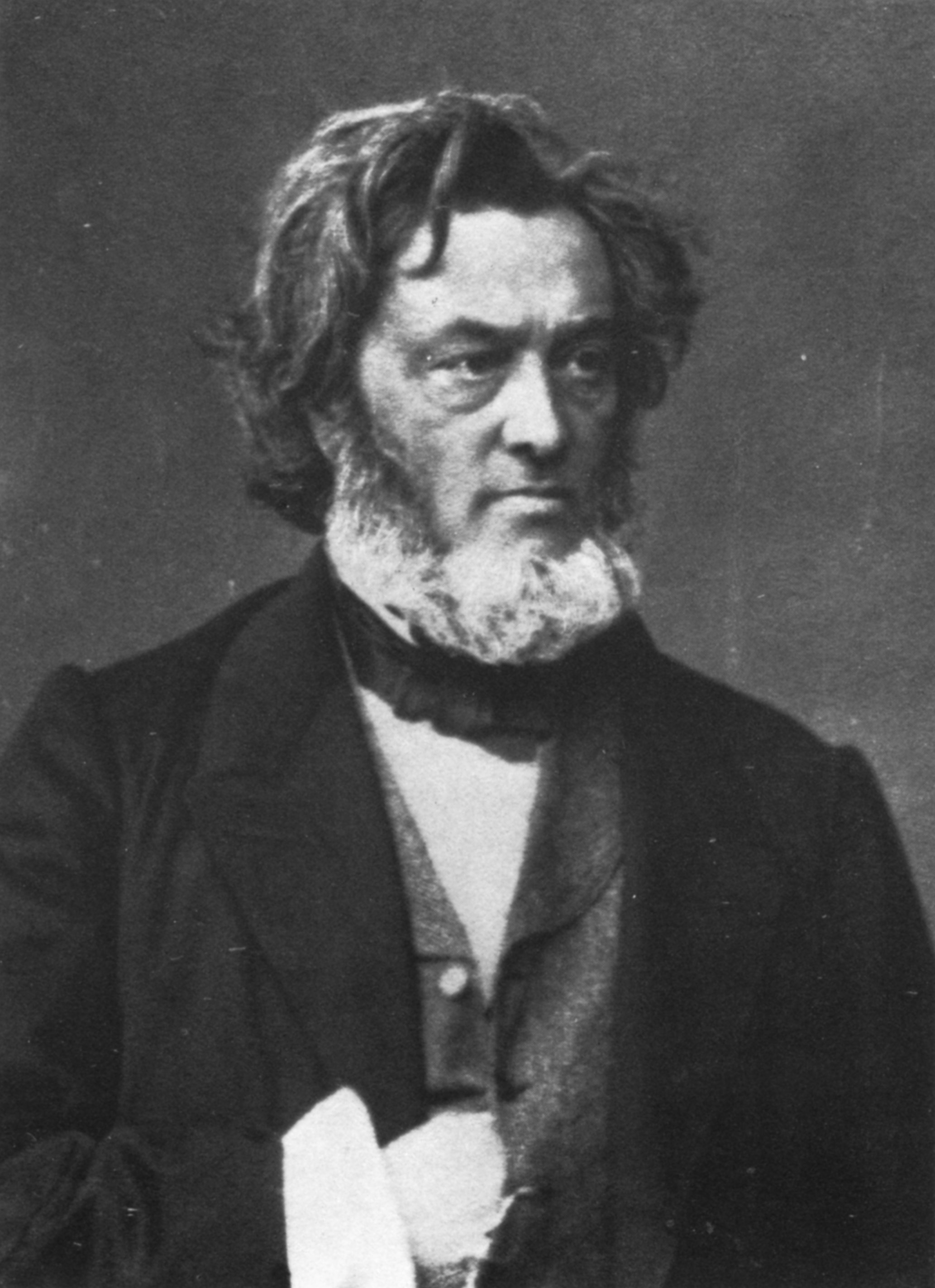 favre
favre Poste Militaire French inf Prussian war
Poste Militaire French inf Prussian war nino bixio in 54mm. Bixio was a Garibaldian then became a regular army officer. He's a legend in Italy. Died of yellow fever in the South seas.
nino bixio in 54mm. Bixio was a Garibaldian then became a regular army officer. He's a legend in Italy. Died of yellow fever in the South seas. Piedmot Cavalry in 54mm.
Piedmot Cavalry in 54mm. Piedmonts attacking
Piedmonts attacking Nino Bixio was sent to Civita Vecchia where resistance was expected, and had been ordered by Kanzler, but the native element prevailed over the foreign in the garrison, and the Spanish commandant, Colonel Serra, interpreting the wishes of the Roman troops, surrendered without firing a shot.
Nino Bixio was sent to Civita Vecchia where resistance was expected, and had been ordered by Kanzler, but the native element prevailed over the foreign in the garrison, and the Spanish commandant, Colonel Serra, interpreting the wishes of the Roman troops, surrendered without firing a shot. Nino Bixio was sent to Civita Vecchia where resistance was expected, and had been ordered by Kanzler, but the native element prevailed over the foreign in the garrison, and the Spanish commandant, Colonel Serra, interpreting the wishes of the Roman troops, surrendered without firing a shot.
Nino Bixio was sent to Civita Vecchia where resistance was expected, and had been ordered by Kanzler, but the native element prevailed over the foreign in the garrison, and the Spanish commandant, Colonel Serra, interpreting the wishes of the Roman troops, surrendered without firing a shot. civitavecchia
civitavecchia the Prussian representative hoping till the last moment to arrange matters in a pacific sense. Cardinal Antonelli is said to have been nearly persuaded, when he received a message from Colonel Charette in these terms: 'You had better go and say mass while we look after defending you.' The war party so far carried the day that the Pope adhered to his plan of 'sufficient resistance to show that he yielded only to force.
the Prussian representative hoping till the last moment to arrange matters in a pacific sense. Cardinal Antonelli is said to have been nearly persuaded, when he received a message from Colonel Charette in these terms: 'You had better go and say mass while we look after defending you.' The war party so far carried the day that the Pope adhered to his plan of 'sufficient resistance to show that he yielded only to force. belgian zouave uniform
belgian zouave uniform
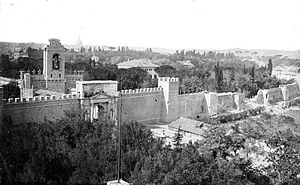



 Algerien Tiralleur Prussian War
Algerien Tiralleur Prussian War light cavalry of lodi by mas in 54mm
light cavalry of lodi by mas in 54mm





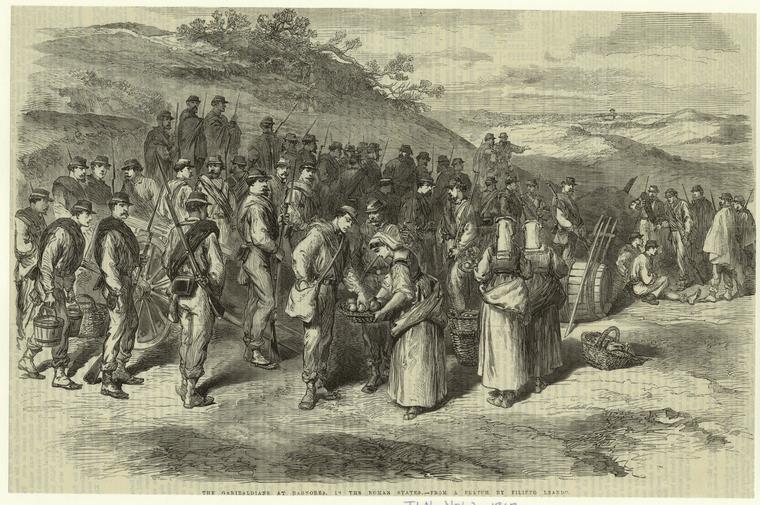
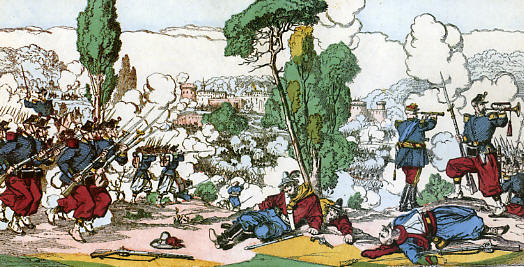


 mentana
mentana 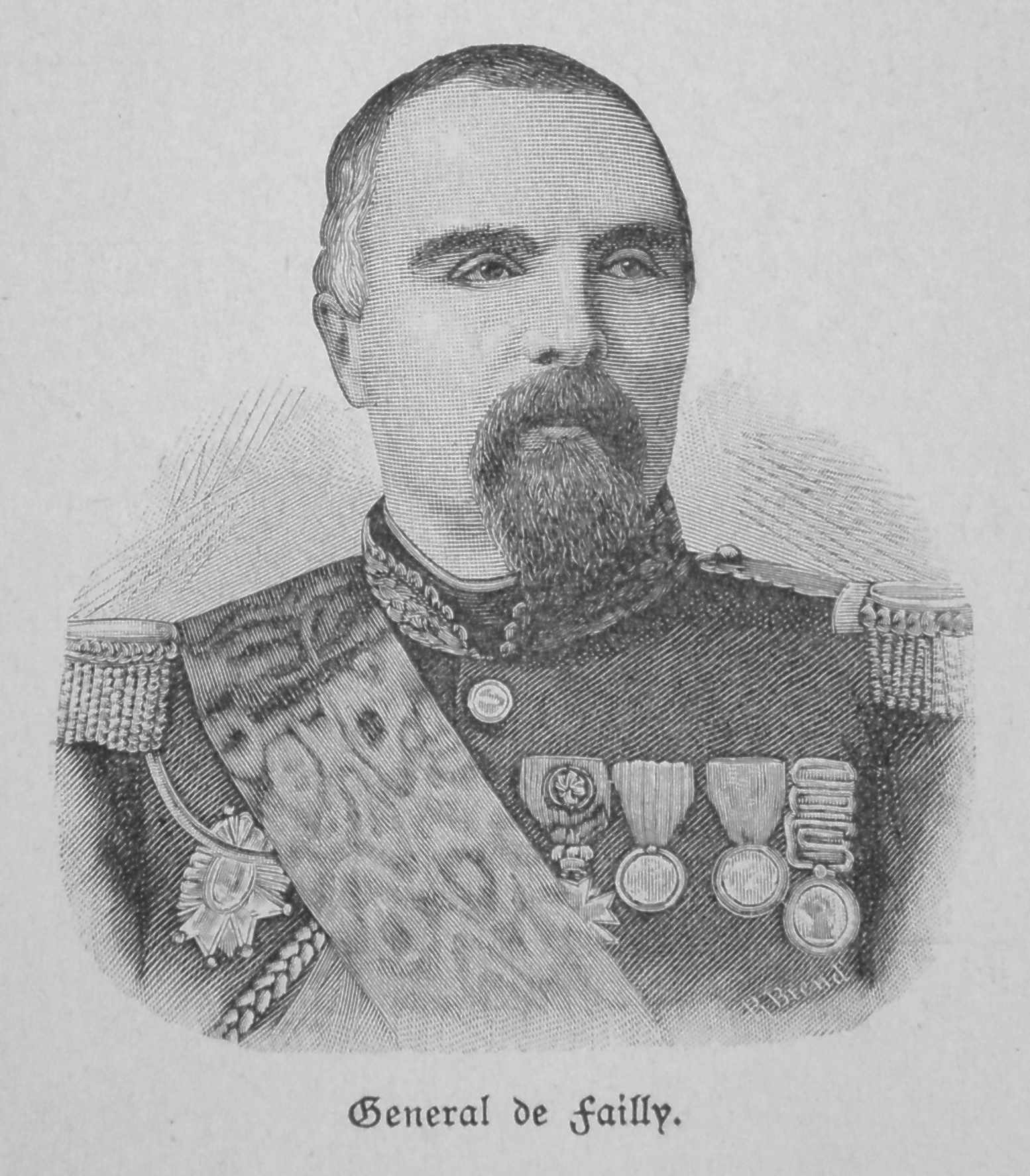















 , had charge of the Zouaves. Since the French garrison left, much trouble had been taken to make this force efficient. Under Garibaldi's own orders there were between 7000 and 8000 volunteers. Those who have made a higher estimate have included other bands which, either from the difficulty of provisioning a larger number, or from want of time for concentration, remained at a distance.
, had charge of the Zouaves. Since the French garrison left, much trouble had been taken to make this force efficient. Under Garibaldi's own orders there were between 7000 and 8000 volunteers. Those who have made a higher estimate have included other bands which, either from the difficulty of provisioning a larger number, or from want of time for concentration, remained at a distance. 






 kanzler
kanzler







